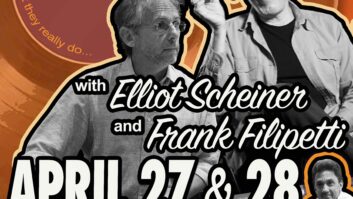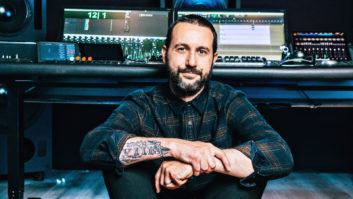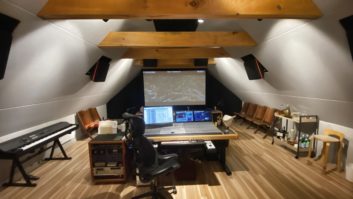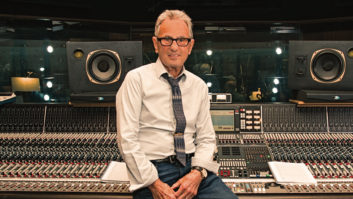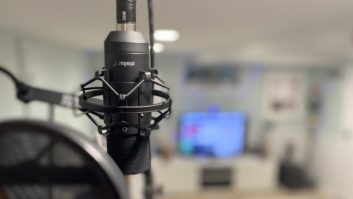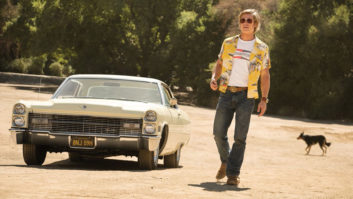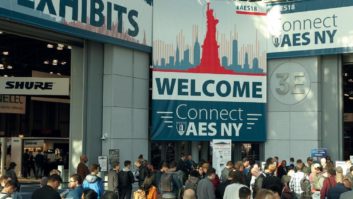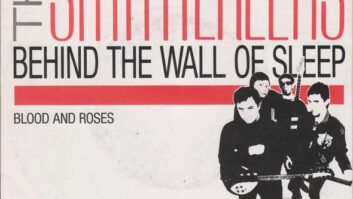
John King, Depeche Mode’s Martin Gore and producer Ben Hillier
during the making of Depeche Mode’s Sounds of the Universe
at Chung King.
By Janice Brown.
Fewer commercial studios means more work for those still in business, and there’s plenty of business in NYC. “More people are making more music than ever before, but with a lot less money,” says Tino Passante, manager at Avatar Studios.
Embracing the times, studio owners now look at the business with a cool resolve. “The business isn’t going anywhere, it’s here,” says John King, owner of Chung King Studios, breaking it down simply: “People need to record and we are here to provide them with what they need.” According to King, “what they need” still includes large-format consoles and high-end, professional facilities. “We’re getting another SSL for the Green Room, so we’ll have two SSLs and two Neves. And I’m putting together some mid-priced studios too.”
Once upon a time, King catered to a predominantly hip-hop clientele, but this year has seen lockouts with artists putting his live rooms to good use – Phish, Depeche Mode, Maxwell and Moby, among them – and some hip-hip-hop collabs like No ID with Richard Ashcroft, and MGMT/Ratatat with Kid Cudi.
King also prefers to book out all of his multiple rooms traditionally, that is without long-term leasing arrangements. All but one of his residents have left the building. “Having the resident clients doesn’t work out very well,” he says. “A few years ago, it made sense because we were all struggling to stay alive, and my rent was cheaper. Now, no resident would be willing to pay me what I’d get for 20 days in the studio. So, if you can book the days, which we can, it’s really not worth it.”
At the same time, the studio resident model has worked very well for Electric Lady and Avatar, creating an important variety in the market, each studio with its own unique culture and subsequent vibe, the all-important X-factor. This particular variable also creates a better balance of bookable rooms to sessions.
Electric Lady welcomed Michael Brauer into Studio B this year, alongside Rich Costey, in Studio C – Rich and his Neve 88R have been camped there for some time. Just recently, Rich relocated to Los Angeles to start a family, but left the Neve behind.
“Rich was with us for 25 months of the last three years, and it was hard to see him go,” says Electric Lady manager Lee Foster. “But the room was booked immediately thereafter, then quickly went on lock down with mixer/producer John O’Mahoney. He’d been here this year, working on records for Metric, The Postelles and Alberta Cross, and is now booked in C though December. John’s star is quickly rising. It’s great to have him.”
Now, with Studio C not yet into a longer-term lock-down, the historic Studio A, and a small production room available, Foster has more to offer his clients. This is a good thing considering the current clientele: Hole with Michael Beinhorn, Interpol, John Mayer, Coldplay and returning clients like Patti Smith, Ryan Adams, Emily Haines & Metric, and Rufus Wainright.
“Folks are still spending the money and value a great studio, that’s for sure,” Foster says. “We’re seeing a lot of self-financed records, including the Metric record. I’ve noticed about half of the projects being financed by the bands, the managers, or some private financing, and half being funded by major labels.”
Avatar’s Passante sees this trend as well: “Nowadays, in all our rooms, the ratio is probably 50 percent self-financed to 50 percent label-financed. This applies to major artists as well, that are paying for their recordings themselves and then making a deal with a label.”
Avatar’s “creative community” of residents grew this year to include producer David Kahne and KBV Records. “The community model is a must for a facility like ours,” notes Passante. “We are a large facility and keeping all the rooms booked is a challenge to say the least. We have to have some built-in business, and our community definitely feeds back a healthy amount. How cool is it to have a resident producer say ‘I need a room for McCartney tomorrow, what do you have?”
Mastering engineer Scott Hull, who quadrupled the size and scope of his facilities by acquiring Masterdisk last year, believes a community format works particularly well in the mastering business. “Mastering engineers who’d set up studios of their own were coming to me because they longed to be in a complex with multiple engineers,” says Hull. “It’s not just the camaraderie they missed, it’s having engineers around you who excel at a particular kind of music or solving a particular problem. It’s important to have colleagues you can share solutions with and technicians you can put to task, so that everyone doesn’t have to re-invent the wheel over and over again.”
With veteran mastering engineers, including Howie Weinberg, Tony Dawsey and Andy VanDette, extensive pro facilities and a new crop of engineers Hull’s mentored, Masterdisk can cover everything from the highest-quality vinyl job to the super-indie band recording on a shoestring. “We can do exceptionally high-quality vinyl here – we have an excellent Neumann lathe, an all-analog cutting path if clients want to cut directly from tape, and four engineers with extensive experience cutting vinyl,” says Hull. “And, I’m launching a new brand called Masterdisk Indie, which will be competitive with the owner/operated studios and offer really quality mastering by our junior engineers, each mentored by a senior engineer.”
Another new team on the scene has developed at Fabrice “Fab” Dupont’s Flux Studios, where the producer/engineer added an impressive tracking studio – The Dangerous Room – to his existing personal mix/master room. “We’ve been able to make entire records, from A to Z, with singer/songwriter Will Knox, R&B singer Chester Gregory, and Brazilian band Forro In The Dark,” Fab notes. “We’ve done records 100 percent live with no editing, no overdubs, no tuning.” Artists such as Bebel Gilberto, Joan Osborne and Afrika Bambaataa have also recorded at Flux since it’s opening in January.
A technology fanatic, Dupont equipped the studio with all of his proven tools and an in-house technician, Joe Russo, to create a very flexible, completely hybrid analog/digital setting. So, when a producer wants to make a record with a band in a few days, Flux has the rooms, the gear and the ears to make that happen.
“We did a 10-song record with Com Voce, a band led by singer Margaret Grebowicz, with Matt Pierson producing,” Dupont shares. “We recorded, mixed and mastered it in three days. [Flux engineer] Meredith McCandless tracked them in one room and I’d grab the file off the network and mix and master it. So when the musicians were leaving at night, they’d pass by and hear the song they recorded that morning, mastered. We’re doing another jazz record in the same way with Matt this month.”
The Cutting Room Studios has taken that full-service concept a step further. “We found that as record labels were paring down, artists weren’t getting the support that they needed, and were left coordinating production themselves,” says David Crafa, owner of The Cutting Room. “As we gradually introduced services like mastering and web development, we saw our clients taking us up on these things. And we’d ask ourselves, what else can we offer? We partnered with a videographer and a web development company so we can produce multi-media content for our clients.”
Beyond its SSL 9000 J-equipped Studio A, The Cutting Room has resident producers in three production suites, and a Studio B that’s uniquely optimized for both mastering and tracking/overdubs. Tony Gillis, formerly of The Hit Factory, is the resident mastering engineer. “In terms of acoustics and monitoring, the room’s setup for mastering, a critical listening environment that’s certainly advantageous to tracking and writing sessions,” Crafa points out. “As for equipment, we added great summing amp – the Neve 8816 – which allows us to switch seamlessly from mastering to tracking. Instead of loading up Sonic Solutions, you load up Pro Tools and the 8816 becomes your console.”
Team spirit is also at the core of Stadiumred owner Claude Zdanow’s business model, which has been propelling the facility up and up since it’s opening two years ago. Reviving the studio formerly owned by Ornette Coleman, Zdanow installed a Digidesign ICON D-Control, a complement of “good all-around mics and good all-around outboard gear,” and found some producer/engineers – Tom Lazarus and Joe Pedulla among them – who wanted to make Stadiumred home base.
“I didn’t go into this knowing about the huge recording budgets studios used to get,” says Zdanow, who was 19 when he found the studio for sale on Craigslist. “I went into it knowing how I’d made a basement recording studio successful in my parents house. I didn’t think I needed to spend tons of money on gear.”
Rather, Zdanow adds, “It’s the team mentality that’s made us. Everyone working here, including Tom, Joe and multi-platinum producer/engineers Ariel Borujow and Sid “Omen” Brown, is pulling to make this a better place. We all feel NYC is a place for music and needs music to come back to it. And I think it slowly is.”
In two years, Zdanow’s expanded the business significantly, adding studios B and C. “We’ve been growing from the start, and we’re still growing,” he assures, hinting at a major expansion project currently in the works. Recent clients include Mos Def (tracking in A with an orchestra), Mims and Thursday. “I also formed an artist management company, using the recording studio as a means to find new talent, adds Zdanow. “Music is about collaboration and we look for ways to be more than just a recording studio and collaborate with our clients on many levels.”
Former PSN recording editor Janice Brown is a founder/editor of the NYC music and sound portal, sonicscoop.com.
Chung King
www.chungkingstudios.com
Avatar
www.avatarstudios.net
Electric Lady
www.electricladystudios.com
Masterdisk
www.masterdisk.com; www.masterdiskindie.com
The Cutting Room
www.thecuttingroom.com
Flux Studios
www.fluxstudios.net
Stadiumred
www.stadiumredny.com
